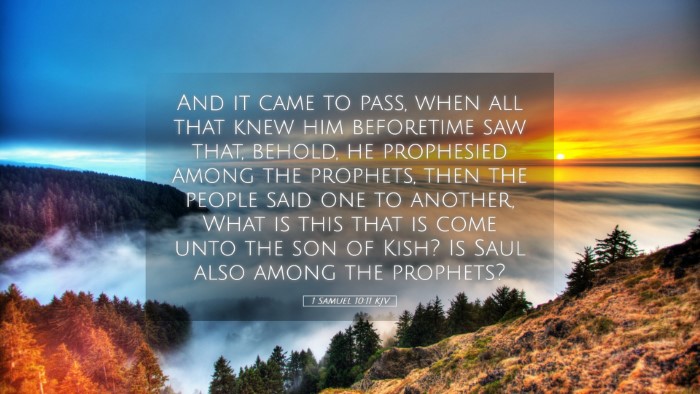Commentary on 1 Samuel 10:11
Verse: “And it came to pass, when all that knew him beforetime saw that, behold, he prophesied among the prophets, then the people said one to another, What is this that is come unto the son of Kish? Is Saul also among the prophets?”
Introduction
This verse is a pivotal moment in the narrative of 1 Samuel, marking a significant transition in the life of Saul, Israel's first king. The passage captures the astonishment of the people as they witness Saul, a man previously characterized by his humility and reluctance, engaging in prophetic activity. This commentary synthesizes insights from various public domain sources to derive meaning for pastors, students, and scholars alike.
The Context of the Passage
Prior to this event, Samuel anointed Saul as king, signifying God's choice over the nation of Israel. The act of anointing was not only ceremonial but also indicative of the divine empowerment Saul would receive. Here, we observe a transformation occurring within Saul's life, as he begins to fulfill his role as a leader among God's people.
Socio-Religious Background
The phenomenon of prophesying was deeply intertwined with the culture and spirituality of ancient Israel. Prophets were seen as vessels through which God communicated His will, and their role was paramount in guiding the nation. The expectation that a future leader might also be a prophet reflects the intertwining of political and spiritual authority in Israel.
Analysis of Key Phrases
“Behold, he prophesied among the prophets”
This phrase signifies more than just Saul's act of prophesying; it illustrates a dramatic shift in his identity. Matthew Henry notes that this public display of spiritual activity was unexpected from Saul, indicating the divine influence in his life. The joy and surprise of those who saw him suggest that they recognized a change that could only be attributed to God.
“What is this that is come unto the son of Kish?”
The people's astonishment signifies the remarkable nature of Saul's transformation. Albert Barnes points out that the question reflects a sense of disbelief and intrigue. This inquiry not only questions Saul's capacity for prophecy but also suggests a broader confusion regarding the nature of his leadership and fulfillment of his destiny. The change challenges their prior perceptions of Saul as a humble and unassuming man.
“Is Saul also among the prophets?”
This rhetorical question indicates the people’s struggle to reconcile the past image of Saul with his new role. Adam Clarke emphasizes that this disbelief is a common human reaction to unexpected transformations, especially in spiritual contexts. The reference to Saul among the prophets suggests that prophecy is not limited to a select few but can be bestowed by God upon whomever He chooses, thus opening the pathway for unexpected leaders.
Theological Implications
This verse underscores several theological themes relevant to contemporary faith communities:
- Divine Empowerment: Saul's experience illustrates that God equips those He calls. This challenges the church to recognize and celebrate the diverse ways in which the Spirit can work in individuals.
- Transformation: The transformation of Saul serves as a reminder that past identities do not define one's future with God. This is a vital message of hope for believers who may feel unqualified for God’s purpose.
- Community Recognition: The astonishment of the community emphasizes the importance of communal affirmation in recognizing spiritual gifts. It invites reflection on how the church supports and acknowledges the empowerment of others.
Practical Applications for Leaders
Pastors and leaders can draw several practical applications from this verse:
- Embrace the Unexpected: Just as Saul’s actions surprised his peers, leaders should be open to God working in unexpected ways and through unexpected people.
- Foster Spiritual Growth: This passage encourages leaders to cultivate an atmosphere where individuals can discover and develop their spiritual gifts, promoting a culture of prophecy and spiritual activity.
- Encourage Humility: Saul’s initial humility teaches leaders the importance of remaining grounded, recognizing that God’s work in them does not stem from personal merit but from divine grace.
Conclusion
1 Samuel 10:11 is a profound reminder of the transformative power of God in an individual's life and the communal responses to such changes. It invites believers to reflect on their perceptions of leadership, prophecy, and the unexpected ways God can work among His people. As leaders and students engage with this text, they are challenged to consider how they might facilitate environments of transformation, recognizing that anyone—regardless of their past—can be called and empowered by God.
May this reflection inspire deeper theological insight and practical application for all who study and preach the Word of God.


